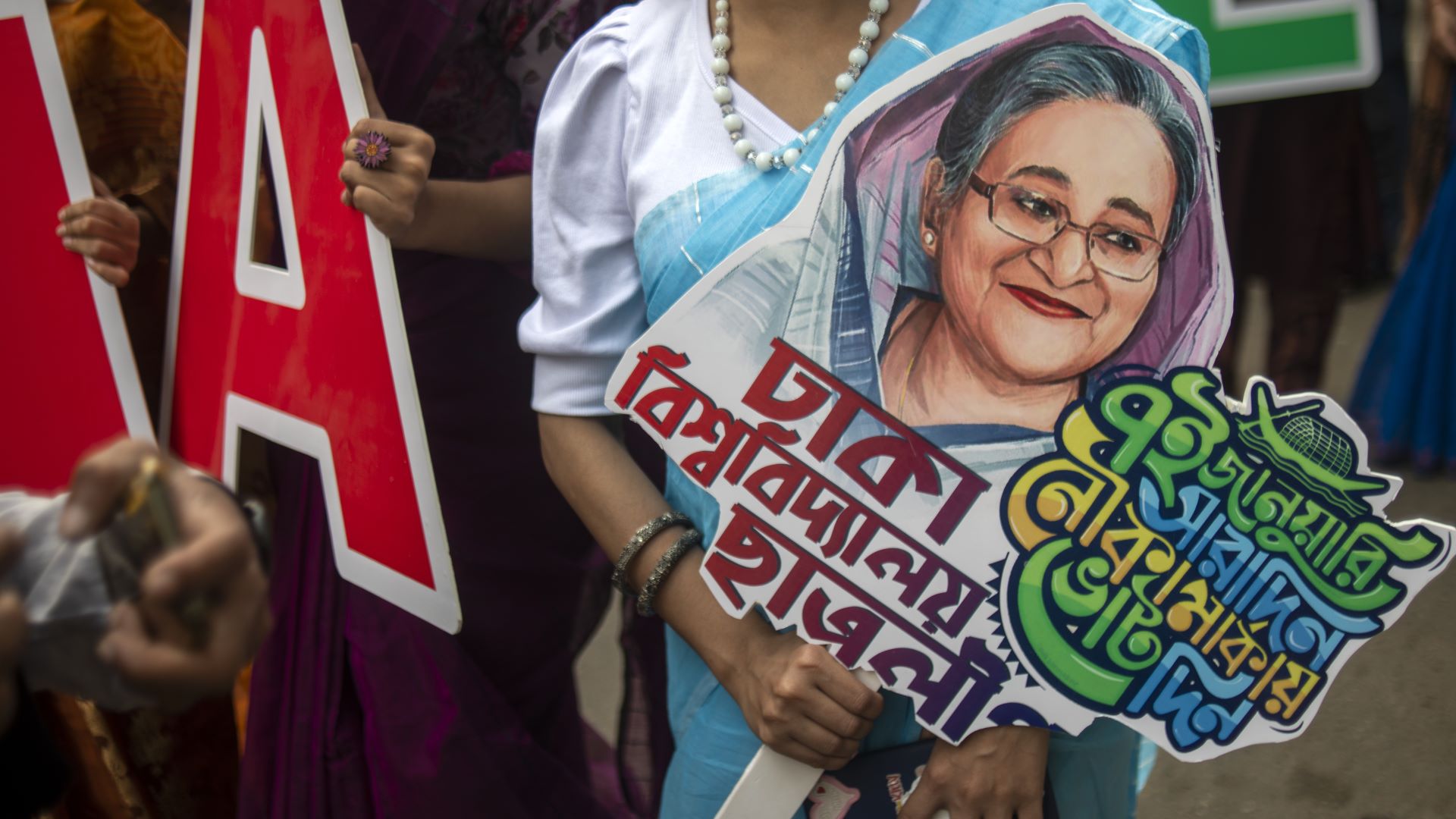Bangladesh elections: censorship, AI deepfakes, and social media polarization
Prime Minister Sheikh Hasina secured her 5th term in Sunday low-turnout election

Citizens across more than 50 countries are expected to vote for their next government in 2024, putting democracy under a microscope worldwide. Bangladesh kicked off this long election season on January 7, and in the process struck the first blow to democratic values.
As expected, Prime Minister Sheikh Hasina secured her fifth mandate. However, that doesn't appear to be a reflection of consensus. "This election is a charade," Bangladeshi rights activist Shahidul Alam commented to Al Jazeera prior to the voting day. "It's a mockery of our democracy—whatever is left of it."
At the head of the country since 2009, 76-year-old Sheikh Hasina is infamous for her repressive authoritarian measures. Last year's Freedom House reported the ruling Awami League (AL) to have "consolidated political power through sustained harassment of the opposition [...] as well as of critical media and voices in civil society." With the BNT boycotting the elections, the inevitable results confirmed Sheikh Hasina's new mandate by securing 223 of 300 parliamentary seats.
Leading up to the elections, a heavy government crackdown left thousands of opposition leaders and their supporters arrested, and at least 11 killed—something that Human Rights Watch described as "a clear attempt to quash the opposition and eliminate competition ahead of the general elections."
The main opposition Bangladesh Nationalist Party (BNP) decided then to withdraw from the electoral race in November, calling for citizens to refrain from voting. This translated to a one-sided low-turnout election whose outcome was inevitable.
With offline pressure increasingly high towards political opponents, the internet came out as the main battlefield. Yet, draconian laws, internet shutdowns, misinformation campaigns powered by AI, dubious political ads, and communications practices were the obstacles to overcome. Bangladesh's political fate might be already decided now, but the country's latest events certainly give us a glimpse of how the online world could impact 2024's electoral campaigns.
Controlling digital narratives
"Due to shrinking civic space, the internet has emerged as a major ground for political expression, particularly dissent. On the other hand, it has become the main tool to shape political narratives with huge investments in information operations from the powers that be," Miraj Chowdhury, Bangla Editor at Global Investigative Journalism Network and Founder of think tank Digitally Right, told me.
Put simply, having a strong social media presence—especially on platforms like Facebook, TikTok, and YouTube—is extremely important for the BNP considering the heavy impediments in the offline world. From its side, the ruling party is doing everything it can to control this space. In 2021, for instance, AL shared its plans for training over 100,000 cyberwarriors.
Get daily insight, inspiration and deals in your inbox
Sign up for breaking news, reviews, opinion, top tech deals, and more.

Chowdhury saw the role of social media in Bangladesh in political campaigns significantly intensifying since the 2018 elections. This influence appears to have grown exponentially in 2023, he said, driven by more accessible formats such as videos, reels, and shorts.
According to Sabhanaz Rashid Diya, founding board director at Tech Global Institute (a tech policy think tank focused on the Global South), in-person interactions and traditional campaigning remain preferred, though, especially in rural areas.
Yet, "internet platforms were particularly crucial for those opposing the incumbent party or protesting against the electoral process," she told me.
Restricted internet freedoms
If, on one side, politicians are learning how to use the internet to support their campaigns, harsh censorship and information blackouts are the reality that journalists, activists, political opponents, and any other citizen have to cope with on a regular basis.
We already mentioned how Sheikh Hasina’s government has been actively cracking down on the free press with continuous harassment and detentions. Things got even worse last September, as authorities passed a new Cyber Security Act which makes it even easier to censor and persecute critical voices.
In 2023, internet shutdowns cost the global economy over $9 billion for a total of 79,238 hours of government-imposed internet or social media blackouts worldwide in what was a very challenging year for internet freedoms. Despite Iran being crowned as the biggest perpetrator in 2023, Bangladesh ranks as the 7th most prolific country in Asia since 2015 according to Surfshark's data.
Despite not enforcing any information blackouts this time, VPN service provider Surfshark recorded six disruptions to the internet since 2015—two of these occurred during elections and the others during periods of political turmoil like protests.
As many people might challenge the election results in the next few days, we recommend staying alert and getting a reliable virtual private network (VPN) to bypass possible online restrictions. Such security software helps you evade censorship by spoofing your IP address as well as government surveillance as it encrypts internet connections. Head to our page of the best free VPNs right now to find out how to get the most secure freebie.
AI-powered misinformation campaigns
The Bangladesh ruling party also managed to uphold worldwide worries by harvesting the power of the new thing in tech to crack down on the opposition: generative AI.
According to Chowdhury AI-powered deepfakes in political campaigns are "still at an experimental level in Bangladesh". Nonetheless, "we have seen alarming examples with the potential to escalate and spread disinformation," he told me.
Major incidents heading to the elections include an AI-generated video accusing US diplomats of interfering in Bangladesh elections and causing political violence, alongside several attempts to discredit opposition leaders by, for example, spreading fake news around their views on delicate geopolitical events like the war in Gaza.
Our recent findings exposed deepfake videos featuring BNP leader Nipun Roy Chowdhury and Rashed Iqbal Khan. #Deepfake #dismislab #Bangladesh #FactCheckhttps://t.co/MMLDQBJdGJAugust 17, 2023
AI deepfakes circulated during the election day, too. Most notably, a video spread across social media in which an independent candidate for the Gaibandha-1 constituency, Abdullah Nahid Nigar, announced to have withdrawn from the election. Fact-checkers at Dismislab could quickly confirm that the fake video was created with the help of AI.
As the Financial Times reported, this AI-powered disinformation content has been generated by "cheap tools offered by artificial intelligence start-ups."
What's at stake?
Experts across the world have been warning about the role of tools like ChatGPT will have in fabricating fake news and influencing public opinion during the biggest election year in history. Bangladesh seems to have paved the way for more developments in this direction.
On this point, Diya from the Tech Global Institute told me: "AI-generated misinformation and targeted attacks on female politicians dominated the lead-up to the Bangladesh election, and we expect to see these trends mirrored in other parts of the world."
People in Taiwan are heading to the polls on January 13, while Pakistan will follow suit on February 8. The biggest democracies in the world are calling their citizens to vote as well: the US in November, and India between April and May. Russia, Mexico, Iran, the UK, and the EU are further elections we all should look out for this year, alongside many across African countries including Senegal and Ghana.
A pattern characterizing Bangladesh's deepfakes that especially worries her is how misleading content was tied to broader geopolitical themes. She said: "The real risk is not false information, rather facts presented in a false context. This is where traditional debunking methods fall short."
According to Dyia, big tech companies owning popular social media platforms have to "recalibrate how they can tackle false context." That's especially important in areas like South Asia which, despite years of under-investments, "represent some of the largest and politically critical democracies in the world," she said.
Besides the misuse of AI, we could expect the level of online censorship and internet restrictions to grow as well. Pakistan, whose elections are scheduled for February 8, already clamped down on social media services to stifle political opponents.
Commenting on what might be in store, Chowdhury told me: "Amid the rise of populism and political polarization globally, half of the world’s population is going to vote in 2024. At this point, we can only hope for the best for the rest."

Chiara is a multimedia journalist committed to covering stories to help promote the rights and denounce the abuses of the digital side of life – wherever cybersecurity, markets, and politics tangle up. She believes an open, uncensored, and private internet is a basic human need and wants to use her knowledge of VPNs to help readers take back control. She writes news, interviews, and analysis on data privacy, online censorship, digital rights, tech policies, and security software, with a special focus on VPNs, for TechRadar and TechRadar Pro. Got a story, tip-off, or something tech-interesting to say? Reach out to chiara.castro@futurenet.com